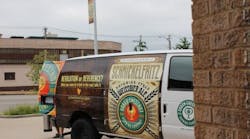Thanks to the kind offices of Siemens, I was able to celebrate International Craft Beer Week in August by visiting several of the larger craft brewers around Saint Louis. Anheuser-Busch-InBEV has been seriously hurt by the craft brewing industry, not least because of the fact that many leading craft brewers are refugees from the big brewers, of which AB-InBEV is the biggest.
URBAN CHESTNUT BREWING CO.
Those of us who work as automation professionals often forget that we produce a means to an end, and not an end in itself. Our customers, clients and co-workers are engaged in making beer, or petroleum products, or consumer products, or chemical formulations, or whatever. Florian showed me his bottling line, which had to be the slowest bottling line I've seen in probably thirty years. It bottles about 1500 bottles an hour. The bottles move with agonizing slowness through the washer, filler, capper and then are hand loaded into boxes.
There is automation, be sure of that. There is a very nice batch automation system that runs the mash mixer, lautering tun and the brew kettle.
They have about twenty-five recipes that they run, but actually run only six or seven of them regularly. When they move to the new brewery, since it is a whole city block long, they will probably go to a central HMI so that they can see everything that's going on without taking a very long walk. For now, as Florian noted, there are two rooms, one for the brewing and one for the bottling line, and they are separated by an archway.
So what can this tell us? Sometimes, in the high tech world—and automation is certainly part of that world—we want to use technology because it is cool. Companies often push technology on customers long before the customers need it or can really use it. But as Urban Chestnut shows us, the use of appropriate levels of technology makes it possible to make product with high quality, high reliability and high repeatability.
SCHLAFLY BOTTLEWORKS
On the other hand, with the Millenial generation, who seem to be born with a smartphone grafted to their hand, those very same mobile worker technologies may be essential to the way they want to work in manufacturing and in the process industries.
It seems to me that the real goal here is what Florian Kuplent said,"I'm here to make beer." Whatever level of automation works to allow the brewers to make beer the best way they know how is the level of automation we should be providing.




